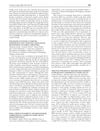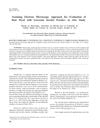 August 2022 in “Archives of pediatric surgery”
August 2022 in “Archives of pediatric surgery” Hair-Thread Tourniquet Syndrome is a rare condition where hair or thread tightly wraps around a child's body part, requiring quick treatment to prevent damage.
 November 2020 in “Elsevier eBooks”
November 2020 in “Elsevier eBooks” Antiandrogens and androgen inhibitors like spironolactone, finasteride, and dutasteride can treat hair loss and skin conditions, but they have risks and side effects, including potential harm to pregnant women and risks of cancer and heart issues. Herbal remedies also have antiandrogenic effects but lack safety validation.
 8 citations,
December 2022 in “Nature Reviews Endocrinology”
8 citations,
December 2022 in “Nature Reviews Endocrinology” Sex hormones' effects on COVID-19 are unclear and more research is needed to understand their potential as treatment.
 4 citations,
December 2021 in “Experimental and Therapeutic Medicine”
4 citations,
December 2021 in “Experimental and Therapeutic Medicine” Adult female acne is complex and requires a combination of treatments for effective management.
 21 citations,
November 2014 in “Journal of Endocrinological Investigation”
21 citations,
November 2014 in “Journal of Endocrinological Investigation” Cross-sex hormone therapy is important for managing gender dysphoria and requires careful monitoring and healthcare provider education.
 20 citations,
July 2009 in “Journal of Pediatric and Adolescent Gynecology”
20 citations,
July 2009 in “Journal of Pediatric and Adolescent Gynecology” Quick treatment of hair disorders in teenage girls is important because of the emotional effects.
 157 citations,
May 2021 in “Endocrine Reviews”
157 citations,
May 2021 in “Endocrine Reviews” Early diagnosis and individualized treatment improve outcomes for Congenital Adrenal Hyperplasia.
 4 citations,
January 2019 in “Dermatologic Therapy”
4 citations,
January 2019 in “Dermatologic Therapy” Scalp basal cell carcinoma may be more aggressive and harder to treat than other types, requiring special attention and further research.
69 citations,
April 2010 in “Clinical ophthalmology” Bimatoprost is effective for growing longer, thicker, and darker eyelashes.
1 citations,
January 2018 in “Advances in cancer prevention” Preventing cancer involves lifestyle changes, vaccinations, early screening, and understanding cancer's molecular basis.
 88 citations,
January 2013 in “Indian Journal of Dermatology, Venereology and Leprology”
88 citations,
January 2013 in “Indian Journal of Dermatology, Venereology and Leprology” Minoxidil and finasteride effectively treat hair loss.
 14 citations,
June 2021 in “British journal of dermatology/British journal of dermatology, Supplement”
14 citations,
June 2021 in “British journal of dermatology/British journal of dermatology, Supplement” Experts agreed on guidelines to improve research on Frontal Fibrosing Alopecia.

The document concludes that dermatology training and grading scales need to better represent dark-skinned individuals to improve diagnosis and assessment of skin conditions.

The study successfully gathered a diverse group of 438 women to understand the prevalence of polycystic ovary syndrome, with most participants recruited online and at community fairs.
 1 citations,
March 2022 in “medRxiv (Cold Spring Harbor Laboratory)”
1 citations,
March 2022 in “medRxiv (Cold Spring Harbor Laboratory)” Polycystic Ovary Syndrome (PCOS) increases the risk of mental health disorders, but its impact on Black Asian Minority Ethnic groups isn't fully known.
2 citations,
April 2021 in “PLoS ONE” Rural Bangladeshi girls mature later than peers in other low and middle-income countries due to poor nutrition and socioeconomic conditions.
 May 2016 in “Cambridge University Press eBooks”
May 2016 in “Cambridge University Press eBooks” Eating disorders are serious, often undiagnosed conditions requiring early treatment, with anorexia being the most deadly and binge-eating the most treatable.
 81 citations,
January 2011 in “European Journal of Internal Medicine”
81 citations,
January 2011 in “European Journal of Internal Medicine” Despite progress, better treatments and understanding are needed for the high rates of long-term issues and deaths linked to eating disorders.
 118 citations,
February 2009 in “Fertility and Sterility”
118 citations,
February 2009 in “Fertility and Sterility” Most women with PCOS have high levels of male hormones, and free testosterone is the best marker for this.
 46 citations,
June 2015 in “Fertility and Sterility”
46 citations,
June 2015 in “Fertility and Sterility” Insulin resistance is significantly linked to a higher risk of depression in women with PCOS.
 35 citations,
May 2015 in “Arquivos De Gastroenterologia”
35 citations,
May 2015 in “Arquivos De Gastroenterologia” Women with PCOS are more likely to have fatty liver disease and worse metabolic health.
 23 citations,
January 2016 in “Journal of Nanjing Medical University”
23 citations,
January 2016 in “Journal of Nanjing Medical University” Overweight women with PCOS are more likely to have excess male hormones.
 16 citations,
February 2016 in “Gynecological Endocrinology”
16 citations,
February 2016 in “Gynecological Endocrinology” Indian women with PCOS from Delhi and Srinagar show different symptoms, with Delhi women having higher obesity and blood sugar issues, and Srinagar women showing more hair growth and testosterone levels.
 76 citations,
November 2010 in “Journal of The American Academy of Dermatology”
76 citations,
November 2010 in “Journal of The American Academy of Dermatology” Some African American women's central scalp hair loss is linked to genetics and past fungal scalp infections, with more research needed on other causes.
 37 citations,
August 2012 in “European Journal of Obstetrics & Gynecology and Reproductive Biology”
37 citations,
August 2012 in “European Journal of Obstetrics & Gynecology and Reproductive Biology” A simplified scoring system can effectively diagnose hirsutism in Chinese women of reproductive age.
4 citations,
January 2018 in “JBRA assisted reproduction” Orlistat helped reduce weight and testosterone in obese women with PCOS but did not significantly affect other androgens or cholesterol levels.
 November 2022 in “Innovation in aging”
November 2022 in “Innovation in aging” Older adults in Puerto Rico often couldn't be tested for hair cortisol due to refusal or lack of hair, with race and hair products affecting results.
 24 citations,
November 2015 in “Annals of Nutrition and Metabolism”
24 citations,
November 2015 in “Annals of Nutrition and Metabolism” Certain SHBG gene variants, like rs727428, are linked to higher testosterone levels in women with PCOS.
 8 citations,
November 2019 in “International Journal of Morphology”
8 citations,
November 2019 in “International Journal of Morphology” Henna dye improves hair cuticle and thickness but effects vary by hair type and health.
 9 citations,
February 2020 in “International Journal of Endocrinology”
9 citations,
February 2020 in “International Journal of Endocrinology” Some men with early hair loss may have a male version of PCOS, affecting hormones and increasing health risks.


























